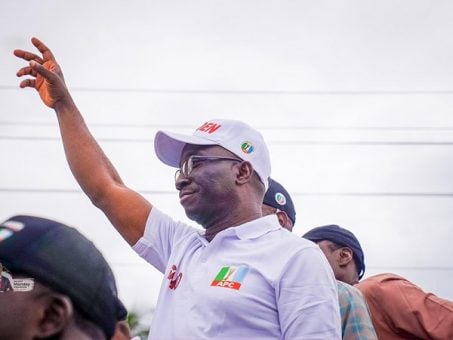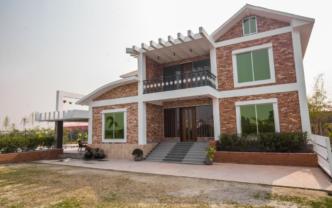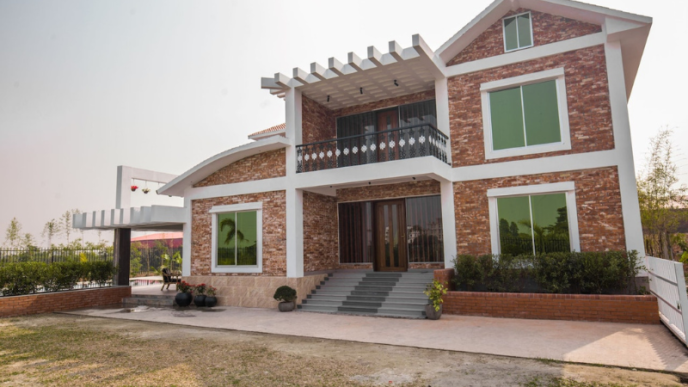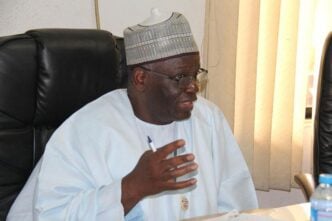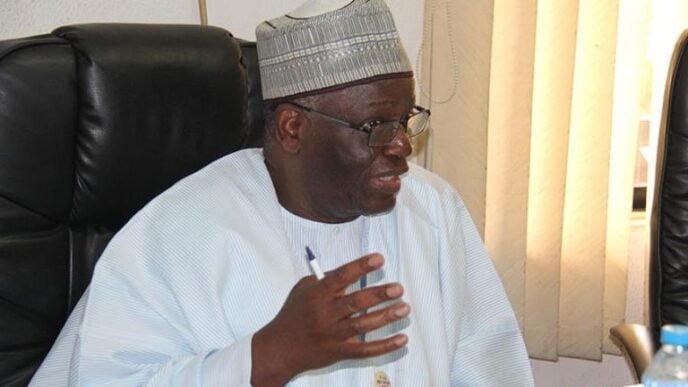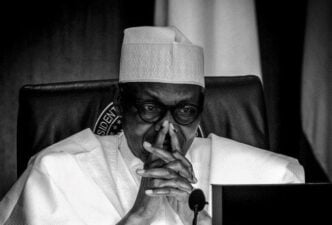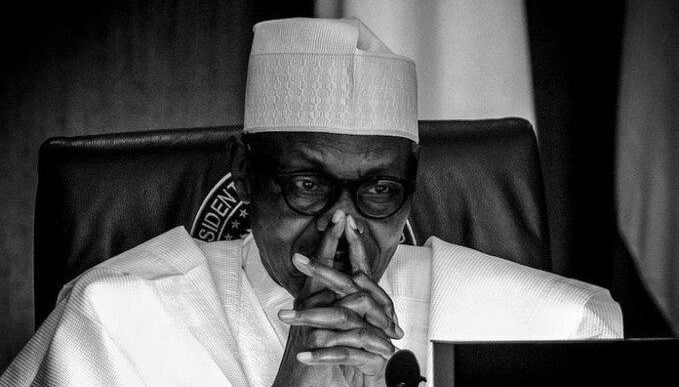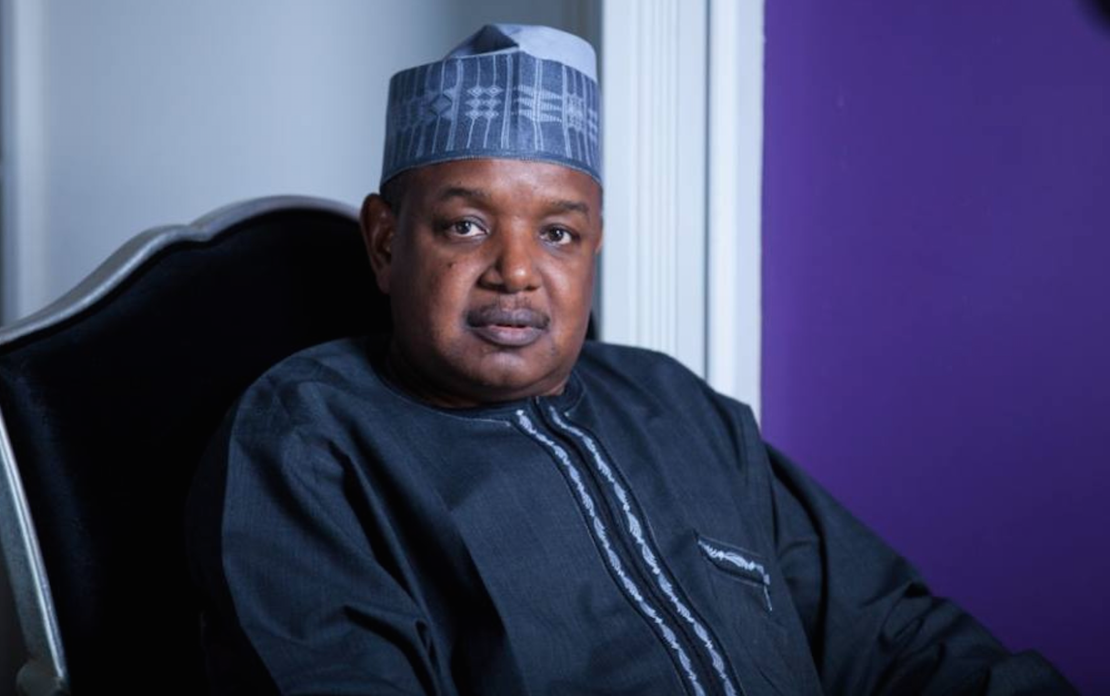BY MICHAEL OYEWOLE
In a now-viral video, the governor of Edo, Monday Okpebholo, was seen issuing what could easily pass off as a threat to the Labour Party presidential candidate in the 2023 elections, Peter Obi, saying he must get security clearance before coming to the state. Okpebholo issued this warning at a political rally in Uromi, citing Obi’s prior visit to Benin on July 7, 2025, where he made a ₦15 million donation to St. Philomena Hospital School of Nursing Sciences. The governor linked Obi’s visit to subsequent unrest, resulting in three fatalities, yet provided no evidence to establish any connection. This unsubstantiated allegation appears to serve as a politically motivated pretext to restrict Obi’s movements, raising serious concerns about the abuse of state power in curbing political opposition.
That unfortunate statement raises significant constitutional concerns. This unconstitutional pronouncement not only jeopardises the personal freedom of citizens but also contravenes the foundational principles of constitutional democracy in Nigeria. To directly quote the governor, he said: “There’s a new sheriff in town. He (Peter Obi) cannot just come into Edo without informing me. His security will not be guaranteed. If anything happens to him here, he will have himself to blame. I’m not joking.” This statement utterly betrays the decorum expected of someone who occupies such a position of authority and reeks of reckless abandon. This kind of rhetoric from a governor implies a lack of restraint, teetering on the edge of irresponsibility, and confirms unbridled misfiring from an unpolished mind.
There is a clear pattern being established here by the incumbent political class. Perhaps, a coordinated move. No doubt, this instance reflects a broader trend of encroachment of fundamental human rights to movement and association by APC-led state governments, evidenced by previous advisories against Obi’s visits, such as a humanitarian mission to an IDP camp in Benue in April 2025. This pattern raises concerns about the ongoing erosion of democratic norms within the country. When governors exercise authority in ways that threaten the security of citizens engaging in constitutionally protected rights, public trust in governance diminishes, and societal divisions are exacerbated.
Advertisement
Okpebholo’s assertion effectively positions the preferences of a state executive above the constitutional rights of Nigerians. This stance undermines the very framework of legal equality and civic liberties as enshrined in our laws. The potential for arbitrary restrictions on an individual’s movement sets a troubling precedent. If one citizen’s mobility can be compromised without due process, it poses a risk to the rights of all citizens. Such practices cultivate an environment where the rule is predicated on expedience rather than law.
For the avoidance of doubt, section 41(1) of the 1999 Constitution, as amended, explicitly states that: “Every citizen of Nigeria is entitled to move freely throughout Nigeria and to reside in any part thereof, and no citizen of Nigeria shall be refused entry thereby or exit therefrom.” More so, Chapter II of the same Constitution mandates the state to “… provide adequate facilities for and encourage free mobility of people, goods and services throughout the Federation.” This provision of our laws is not merely discretionary but rather a binding constitutional obligation.
Also, international human rights standards, as outlined in Article 13 of the Universal Declaration of Human Rights and Article 12 of the International Covenant on Civil and Political Rights, affirm the right to freedom of movement, which Nigeria, as a signatory, is obligated to uphold. The Edo governor lacks the authority to suspend these rights for political expediency.
Advertisement
The right to free movement, as enshrined in our law, is not merely a legal entitlement; it is the vital artery of a cohesive nation. Nigeria’s diversity serves as an asset, necessitating interaction, trade, and collaboration across state boundaries for its realisation. When state authorities impose movement restrictions, they manufacture unnatural barriers that dilute national cohesion and encourage regionalism. These actions also pose risks to investment and tourism, as potential stakeholders may be deterred by fears of arbitrary governance.
From legal perspectives, any limitations on freedom of movement must conform to the strict criteria outlined in Section 41(2) of the constitution, namely, that such restrictions are narrow, rare, and must be judicially enforceable. Unfortunately, Okpebholo’s statement fails to meet these requirements: 1. It lacks a judicial order or due process; 2. There are no substantiated claims of threats to public order.; and 3. It is evidently politically motivated, targeting a prominent figure from the opposition.
The Constitution of Nigeria guarantees freedom of movement and trade, not as privileges conferred by governmental authority but as inalienable rights. No public official has the unilateral power to revoke these rights. Governor Okpebholo’s pronouncement must be retracted to prevent potential accountability issues before the supreme court.
In a democratic society governed by law, all entities, particularly the government, must adhere to constitutional mandates. Any deviation from this principle is tantamount to tyranny. Therefore, the pronouncement of Okpebholo not only undermines democratic ideals but also establishes a precarious precedent for the curtailment of citizens’ mobility within the country.
Advertisement
It is important to note that the ramifications of such an unconstitutional directive are extensive. A precedent allowing governors to unilaterally impose security clearance for entry into their states could lead to a fragmented national landscape where citizens face arbitrary restrictions imposed by local authorities. Such fragmentation threatens personal liberties, economic stability, and social cohesion. Moreover, curtailing the movement of individuals inevitably disrupts the associated flow of goods, which is vital for the nation’s economy, potentially leading to supply chain interruptions and detriments for small businesses that navigate interstate commerce.
Need I remind Mr. Governor that his directive carries the potential to intensify political tensions? By targeting Peter Obi, who commands a significant national following, the governor’s statements could be interpreted as an attempt to marginalise and stifle opposition voices, fundamentally challenging the democratic fabric of Nigeria. History records that such restrictions on the movement of targeted individuals have been used to suppress political opposition, as seen during the military regimes in Nigeria, where freedom of movement was often curtailed under the guise of national or state security.
Any attempt to restrict the free movement of people and goods within a country is an affront to constitutional principles and a threat to national prosperity. We must stand united in condemning such actions and reaffirming our commitment to the liberties that define us. Let us protect the right to free movement, not as an abstract ideal, but as a practical necessity for a free and flourishing society.
Without mincing words, let me state, unequivocally, it is now imperative for Governor Monday to rescind this warning immediately, issue a formal apology for undermining constitutional rights, and reaffirm Edo state’s commitment to the rule of law.
Advertisement
Michael Oyewole writes from Ilogbo-Ekiti and can be reached via [email protected]
Advertisement
Views expressed by contributors are strictly personal and not of TheCable.
